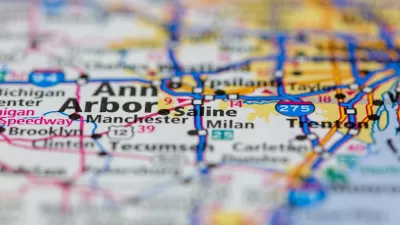More state legislatures are considering fees based on vehicle miles traveled as a replacement for declining gas tax revenues.

As gas tax revenues dwindle thanks to electric and other more fuel-efficient vehicles, states are looking to new sources of transportation funding. But as Jared Brey reports in Governing, a road user fee based on vehicle miles traveled (VMT) is still a hard sell in most places.
To date, Oregon offers a voluntary road user charge program, Utah lets EV drivers opt for a VMT charge instead of a flat fee, and Hawai’i launched an optional VMT fee this year. Over a dozen states have pilot programs funded by the 2015 federal FAST Act. “They’ve helped answer questions about how to track mileage accurately while protecting drivers’ privacy, and some states have collaborated on programs that could track mileage on interstate travel.”
This year, three states — Massachusetts, Illinois, and Washington — are considering legislation to pass some kind of VMT charges. Revenue from the charges could help fill the massive budget gaps faced by transit agencies such as the Massachusetts Bay Transportation Authority and Chicago-area transit systems. One Washington state senator approached it as an equity issue, noting that rural residents with less fuel-efficient vehicles tend to bear the brunt of the gas tax.
Not all states are moving away from the gas tax. A proposal in the Mississippi legislature would eliminate the state’s income tax — already one of the lowest in the country and one-third of the state’s budget — and raise the gas tax.
With the politics of road user fees often being unpredictable, it remains to be seen how the Trump administration will approach the issue when it comes to federal funding and policy.
FULL STORY: Road User Fees Still a Tough Sell in State Legislatures

Planetizen Federal Action Tracker
A weekly monitor of how Trump’s orders and actions are impacting planners and planning in America.

Restaurant Patios Were a Pandemic Win — Why Were They so Hard to Keep?
Social distancing requirements and changes in travel patterns prompted cities to pilot new uses for street and sidewalk space. Then it got complicated.

Map: Where Senate Republicans Want to Sell Your Public Lands
For public land advocates, the Senate Republicans’ proposal to sell millions of acres of public land in the West is “the biggest fight of their careers.”

Maui's Vacation Rental Debate Turns Ugly
Verbal attacks, misinformation campaigns and fistfights plague a high-stakes debate to convert thousands of vacation rentals into long-term housing.

San Francisco Suspends Traffic Calming Amidst Record Deaths
Citing “a challenging fiscal landscape,” the city will cease the program on the heels of 42 traffic deaths, including 24 pedestrians.

California Homeless Arrests, Citations Spike After Ruling
An investigation reveals that anti-homeless actions increased up to 500% after Grants Pass v. Johnson — even in cities claiming no policy change.
Urban Design for Planners 1: Software Tools
This six-course series explores essential urban design concepts using open source software and equips planners with the tools they need to participate fully in the urban design process.
Planning for Universal Design
Learn the tools for implementing Universal Design in planning regulations.
Heyer Gruel & Associates PA
JM Goldson LLC
Custer County Colorado
City of Camden Redevelopment Agency
City of Astoria
Transportation Research & Education Center (TREC) at Portland State University
Camden Redevelopment Agency
City of Claremont
Municipality of Princeton (NJ)





























